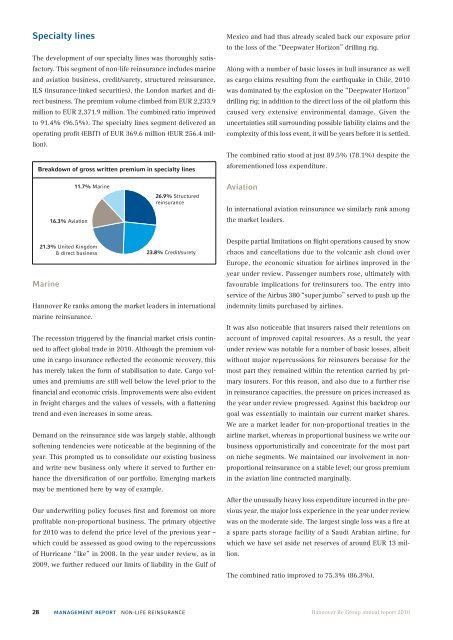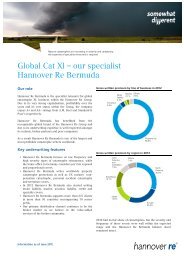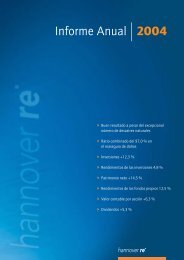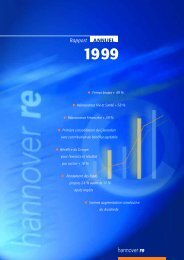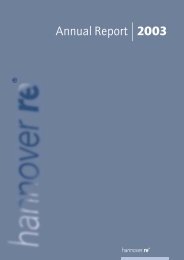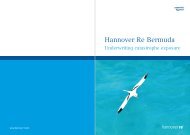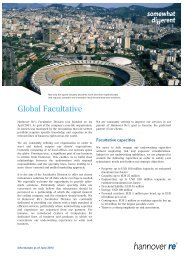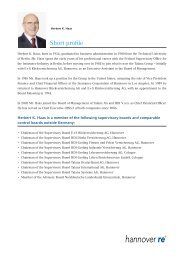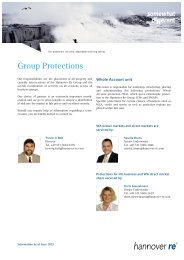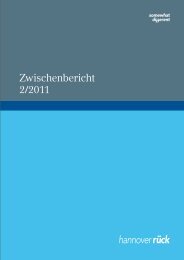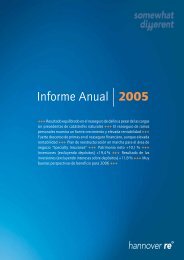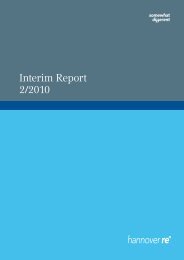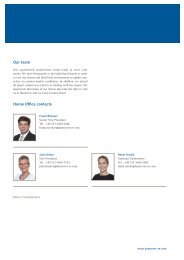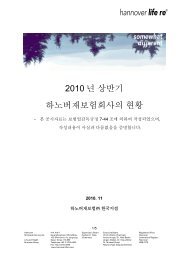Annual Report 2010 - Hannover Re
Annual Report 2010 - Hannover Re
Annual Report 2010 - Hannover Re
You also want an ePaper? Increase the reach of your titles
YUMPU automatically turns print PDFs into web optimized ePapers that Google loves.
Specialty lines<br />
The development of our specialty lines was thoroughly satisfactory.<br />
This segment of non-life reinsurance includes marine<br />
and aviation business, credit/surety, structured reinsurance,<br />
ILS (insurance-linked securities), the London market and direct<br />
business. The premium volume climbed from EUR 2,233.9<br />
million to EUR 2,371.9 million. The combined ratio improved<br />
to 91.4% (96.5%). The specialty lines segment delivered an<br />
operating profit (EBIT) of EUR 369.6 million (EUR 256.4 million).<br />
Breakdown of gross written premium in specialty lines<br />
Mexico and had thus already scaled back our exposure prior<br />
to the loss of the “Deepwater Horizon” drilling rig.<br />
Along with a number of basic losses in hull insurance as well<br />
as cargo claims resulting from the earthquake in Chile, <strong>2010</strong><br />
was dominated by the explosion on the “Deepwater Horizon”<br />
drilling rig; in addition to the direct loss of the oil platform this<br />
caused very extensive environmental damage. Given the<br />
uncertainties still surrounding possible liability claims and the<br />
complexity of this loss event, it will be years before it is settled.<br />
The combined ratio stood at just 89.5% (78.1%) despite the<br />
aforementioned loss expenditure.<br />
16.3% Aviation<br />
11.7% Marine<br />
26.9% Structured<br />
reinsurance<br />
Aviation<br />
In international aviation reinsurance we similarly rank among<br />
the market leaders.<br />
21.3% United Kingdom<br />
& direct business<br />
Marine<br />
23.8% Credit/surety<br />
<strong>Hannover</strong> <strong>Re</strong> ranks among the market leaders in international<br />
marine reinsurance.<br />
The recession triggered by the financial market crisis continued<br />
to affect global trade in <strong>2010</strong>. Although the premium volume<br />
in cargo insurance reflected the economic recovery, this<br />
has merely taken the form of stabilisation to date. Cargo volumes<br />
and premiums are still well below the level prior to the<br />
financial and economic crisis. Improvements were also evident<br />
in freight charges and the values of vessels, with a flattening<br />
trend and even increases in some areas.<br />
Demand on the reinsurance side was largely stable, although<br />
softening tendencies were noticeable at the beginning of the<br />
year. This prompted us to consolidate our existing business<br />
and write new business only where it served to further enhance<br />
the diversification of our portfolio. Emerging markets<br />
may be mentioned here by way of example.<br />
Our underwriting policy focuses first and foremost on more<br />
profitable non-proportional business. The primary objective<br />
for <strong>2010</strong> was to defend the price level of the previous year –<br />
which could be assessed as good owing to the repercussions<br />
of Hurricane “Ike” in 2008. In the year under review, as in<br />
2009, we further reduced our limits of liability in the Gulf of<br />
Despite partial limitations on flight operations caused by snow<br />
chaos and cancellations due to the volcanic ash cloud over<br />
Europe, the economic situation for airlines improved in the<br />
year under review. Passenger numbers rose, ultimately with<br />
favourable implications for (re)insurers too. The entry into<br />
service of the Airbus 380 “super jumbo” served to push up the<br />
indemnity limits purchased by airlines.<br />
It was also noticeable that insurers raised their retentions on<br />
account of improved capital resources. As a result, the year<br />
under review was notable for a number of basic losses, albeit<br />
without major repercussions for reinsurers because for the<br />
most part they remained within the retention carried by primary<br />
insurers. For this reason, and also due to a further rise<br />
in reinsurance capacities, the pressure on prices increased as<br />
the year under review progressed. Against this backdrop our<br />
goal was essentially to maintain our current market shares.<br />
We are a market leader for non-proportional treaties in the<br />
airline market, whereas in proportional business we write our<br />
business opportunistically and concentrate for the most part<br />
on niche segments. We maintained our involvement in nonproportional<br />
reinsurance on a stable level; our gross premium<br />
in the aviation line contracted marginally.<br />
After the unusually heavy loss expenditure incurred in the previous<br />
year, the major loss experience in the year under review<br />
was on the moderate side. The largest single loss was a fire at<br />
a spare parts storage facility of a Saudi Arabian airline, for<br />
which we have set aside net reserves of around EUR 13 million.<br />
The combined ratio improved to 75.3% (86.3%).<br />
28 Management report Non-life reinsurance<br />
<strong>Hannover</strong> <strong>Re</strong> Group annual report <strong>2010</strong>


